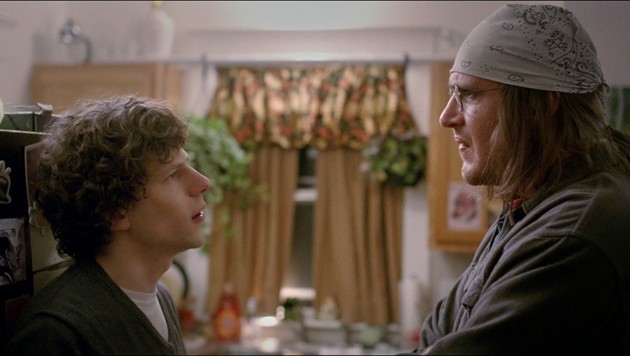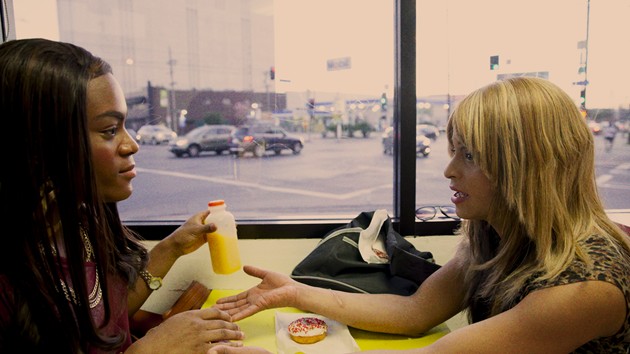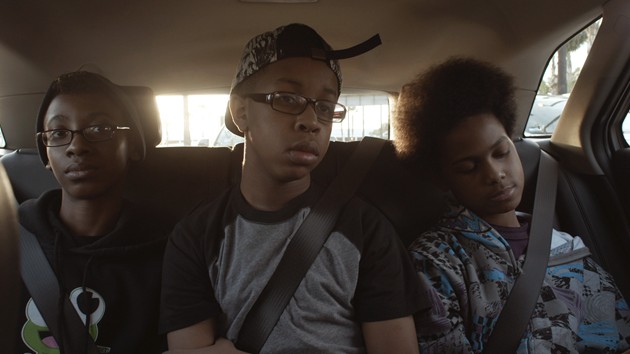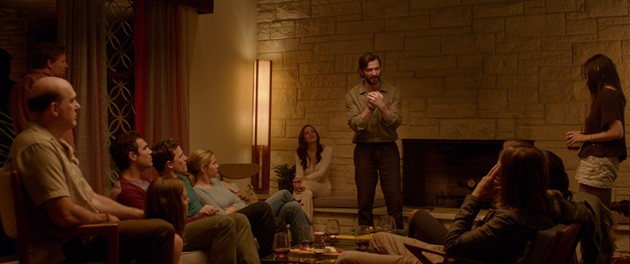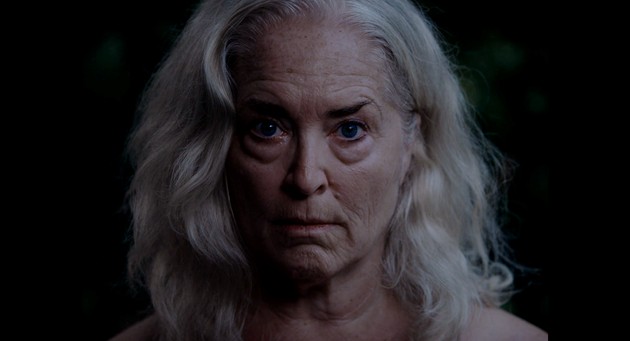BAMcinemaFest 2015 Showcases Some Of The Finest American Independent Cinema










THE END OF THE TOUR (James Ponsoldt) *OPENING NIGHT FILM
A gently elegiac biopic/road movie/portrait of the artist, The End of the Tour boasts great performances by its leads and a compelling presentation of material that, at least on paper, would seem to be very talky and quite un-cinematic, indeed theatrical. (In fact, Pulitzer Prize-winning playwright Donald Margulies penned the screenplay). The film is based on David Lipsky’s memoir Although Of Course You End Up Becoming Yourself: A Road Trip with David Foster Wallace, written after Wallace’s 2008 suicide. The memoir, and film, follows Lipsky (Jesse Eisenberg) as he accompanies Wallace (Jason Segel) on the final leg of his 1996 book tour in support of Infinite Jest, the nearly 1100-page doorstop of a novel which is his most famous work. Lipsky was there to interview Wallace for a Rolling Stone profile, which ended up never being published. Lipsky had recently returned to journalism after publishing two well-received but not very popular novels himself.
The End of the Tour vividly details the verbal and psychological pas de deux between the two men, which was by turns intense, distantly friendly, and combative. Lipsky, with his ever present tape recorder, determined to catch unguarded and confessional moments, is clearly envious of his much more successful interview subject. Wallace, on the other hand, is ambivalent and anxious about his fame, feelings exacerbated by his history of depression, and his constant questioning of himself and how this mass media attention will affect his art and how he practices it. Segel delivers the finest performance of his career to date, during which he all but disappears into his role as David Foster Wallace, capturing both the author’s awkward physical demeanor (as a sort of 1990’s-era hippie), and the psychological pain that is never far below the surface, even in his seemingly happier moments. Eisenberg matches him note for note, nicely conveying how Lipsky’s interactions with Wallace both inspire him and force him to recognize some uncomfortable truths about himself. The beautifully rendered wintry Midwestern atmosphere, and an unusually moody, melancholy Danny Elfman score complete this impressive package.
(June 17, 7:30pm)
TANGERINE (Sean Baker) *CLOSING NIGHT FILM
As full of crackling, live-wire energy as its main characters, Tangerine bursts with life and brilliant color, combining documentary-like realism with candy-colored magic. It’s the latest film from Sean Baker, one of the U.S.’s finest independent filmmakers, whose cinematic stock in trade is immersing the viewer into the lives of people who tend to be marginalized by the larger society, amply demonstrated in such previous works as Take Out, Prince of Broadway, and Starlet. Tangerine finds Baker delivering his most audacious aesthetic yet: this was filmed entirely with the iPhone 5s, fitted with anamorphic lenses, which lends its rough-and-ready photography a classically cinematic look. Jittering with the nervously erratic energy of a meth-head (its pulsating trap-music soundtrack a perfect accompaniment), Tangerine follows two transgender BFFs in L.A., Sin-Dee Rella (Kitana Kiki Rodriguez) and Alexandra (Mya Taylor), on Christmas Eve as they search for Sin-Dee’s boyfriend/pimp Chester (James Ransone), who apparently has been cheating on Sin-Dee with a “real fish” (i.e.. a biological woman) during the month Sin-Dee has been locked down in jail, an incarceration she’s just emerged from. Sin-Dee and Alexandra make their living as working girls (and I don’t mean office workers), plying their trade mostly on the environs of Santa Monica Boulevard. Another narrative thread follows an Armenian cabbie (Karren Karagulian, a Baker regular), whose connection to these other characters is unclear at first, but is soon memorably revealed later on. (Without giving too much away, let’s just say you won’t look at a car wash quite the same way again after seeing this film.)
Tangerine, with its two actual transgender leads, both non-professional actors who are friends in real life, has the good fortune of congruence with the current zeitgeist. But this is a world far removed from the tabloid and reality-TV spectacle aspects of the Caitlyn Jenner drama; these are characters who live in a world populated by druggies, pimps, and prostitutes. However, there is a love and camaraderie that also exists, one which is quite beautiful and nurturing, indicated by the quietly lovely note on which Tangerine ends. Sean Baker and company (including the fine work by co-DP Radium Cheung, who shared cinematography duties with the director), with this film, have blessed us with a wonderful early Christmas gift.
(June 28, 6:30pm)
QUEEN OF EARTH (Alex Ross Perry) *CENTERPIECE
Perry takes a sharp left turn from the caustic comic misanthropy of his previous feature, last year’s Listen Up Philip, to offer a much quieter and more intimate chamber piece about two women and the disintegration of their friendship, largely because of their relationships to the men in their life. Perry re-teams with Elisabeth Moss from Listen Up Philip, who delivers an astonishing performance as Catherine, who at the outset is reeling from the twin body blows of her father’s recent death and a bitter breakup with her boyfriend (Kentucker Audley). (The film’s remarkable first shot is filled with a close-up of Catherine’s tear-stained visage at the moment her boyfriend dumps her.) To try to decompress and recover from this trauma, Catherine decamps to the lake house of her best friend Virginia (Katherine Waterston).
Catherine initially finds some camaraderie and a sympathetic ear from Virginia, but it isn’t long before long-simmering tensions between the two friends emerge. As revealed by flashbacks that are sinuously woven into the narrative, their positions were reversed a year ago at that same house: Virginia was having life issues while Catherine reveled in (and often smugly displayed) her contentment and romantic fulfillment. But now, with Catherine in distress and Virginia now pursuing a relationship with her next-door neighbor (Patrick Fugit), Catherine spins ever further into a severe psychological unraveling.
Perry trades the largely literary influences of his earlier films for more direct cinematic ones here: shades of Persona, Repulsion and The Shining are evident, and Perry himself cites Fassbinder’s Martha and The Bitter Tears of Petra von Kant, as well as Woody Allen’s Interiors, as major influences on this film. However, these allusions don’t unduly call attention to themselves, since his insights into how the trappings of privilege and the self-delusions his characters indulge in fail to mask their pain and unresolved issues are so piercing and almost painful. Perry surrounds himself with his usual ace collaborators, who step up to the plate in a major way in contributing to make Queen of Earth a fascinating and multifaceted work of art. Sean Price Williams’ 16mm cinematography is warm and richly textured, vividly depicting the psychological claustrophobia of both interiors and exteriors; Keegan DeWitt’s stark, eerie piano score bolsters the isolation inherent in the scenario; and Robert Greene’s editing effectively juxtaposes the sunnier past and the shadowy present.
(June 22, 7pm)
ADVANTAGEOUS (Jennifer Phang)
A belated follow-up to her 2008 feature Half-Life, and an expansion of her 2012 short of the same name, Phang's Advantageous is a solemn and haunting slice of dystopian sci-fi that ponders on what happens to humanity, and indeed the very definition of a human being, in the face of ever expanding technological progress. Phang’s inquiries take on a decidedly feminist bent here, most immediately recalling such works as Margaret Atwood’s The Handmaid’s Tale. In the near-future world depicted in Advantageous, social and political enlightenment has been on a backward trajectory as science and technology has been rushing forward.
Gwen Koh (co-writer/co-producer Jacqueline Kim) is a single mother whose main focus is in caring for her young daughter Jules (Samantha Kim), and ensuring that she will have the best future possible. Koh has been working as the spokesperson for an organizational facility called The Center for advanced Health and Living, a rather Orwellian-named corporation that offers radical youth-preserving procedures for its patients. When she learns that she’s about to be laid off for a more youthful advocate, Koh hits on a desperate solution to keep her job and to ensure her standard of living and Jules’ future prospects. She submits herself as a test subject for the company’s new invention, a procedure that will transfer her consciousness to another body, more attractive and “universal” in looks and ethnicity. The true dangers and risks of this procedure don’t become apparent until late in the story.
Phang mostly succeeds in vividly detailing a near-future society in which everyone seems to exist in a state of fear, trying to hold on to their tenuous societal status, and where explosions and falling debris are as unremarkable a sight as the speeding drones that travel the skies above. The core relationship between Gwen and Jules is sensitively acted and forms the emotional heart of the film. As impressive as much of the film is, it’s marred by an unwieldy and flawed structure, and a tendency of stilted dialogue that declaims ideas rather than getting at the feelings behind them. This sometimes makes the narrative crawl at a snail’s pace and mutes the emotional aspects of the story. Still, Phang has come up with a memorable exploration of what it means to be human.
(June 21, 5pm)
BREAKING A MONSTER (Luke Meyer)
This is an immensely entertaining and revealing music documentary following a band on the verge of stardom. The unusual twist is that this particular band is Unlocking the Truth, a trio of 12 and 13-year old black kids from Brooklyn who play musically accomplished and energetic speed metal. Malcolm Brickhouse (guitar/vocal), Alec Atkins (bass), and Jarad Dawkins (drums), met and began playing this music during grade school. (Two of the members recall becoming interested in the music from hearing heavy metal being played in the background of pro-wrestling matches and anime TV shows, and being intrigued.) After clips of their street performances garner massive attention on YouTube, they get representation from Alan Sacks, a 70-year old white manager who previously created Welcome Back Kotter and helped steer the careers of Disney sensations The Jonas Brothers and Demi Lovato. In short order, they sign a contract with Sony Music, with a figure of $1.8 million that is repeatedly bandied about in the media.
Things seem to be looking up for the boys; however, they soon become frustrated by the lumbering corporate pace and the minutiae involved in dealing with a major label, who keeps delaying their efforts to make an album and actually have a solid repertoire of recordings and product in the marketplace. The duties and responsibilities of being burgeoning rock stars also interfere with their desire to just have fun like normal kids their age. Breaking a Monster is a breezy, delightful watch containing memorable characters and illuminating insights into the music business and how fame and personal stories are shaped and transformed by media attention.
(June 20, 4pm)
COP CAR (Luke Meyer)
The minimalist action thriller Cop Car has an intriguingly fun premise: two pre-teen kids (James Freedson-Jackson and Hays Wellford), seemingly having run away from home, come upon an abandoned cop car in the woods. After daring each other to get into the car, similarly to how they earlier dared themselves to say progressively worse curse words, they’re soon behind the wheel and cruising down the road, even though they can’t drive and can barely see over the steering wheel. Little do they know that they’ve stumbled into a whole heap of trouble: the car belongs to a crooked, bumbling sheriff (Kevin Bacon, clearly having much fun), and unbeknownst to the boys, the car has another passenger in the trunk (Shea Whigham). Detailed in flashbacks sprinkled throughout are the settings for the later battle between the two men that the boys will literally be caught in the middle of.
Cop Car intriguingly contrasts the serenity, and indeed blandness, of its Midwestern landscapes with the bloody action that occurs within them. The kids’ innocence very violently meets with the experience that comes courtesy of the adults they encounter. The simplicity of the setup, initially an asset, becomes a liability in the later stretches when the minimal premise struggles to sustain itself, and so to speak, begins, spinning its wheels a bit. Also, there’s a Tarantino-esque jokiness to the violence that uncomfortably makes light of the very real dangers of firearms, especially when passersby get casually blown away and the kids are shown playfully pointing loaded guns at each other. Nevertheless, Cop Car largely delivers on its promise to be a greatly diverting, comic action romp.
(June 21, 8pm)
THE GRIEF OF OTHERS (Patrick Wang)
Wang’s second feature, an adaptation of Leah Hager Cohen’s novel, is a compelling portrait of a family atomized by a tragedy that has struck them, their contrasting ways of processing the resulting grief, and their eventual reconciliation. John and Ricky Ryrie (Trevor St. John and Wendy Moniz) live in the town of Nyack in upstate New York with their two children: daughter Biscuit (Oona Lawrence) and her older brother Paul (Jeremy Shinder). John and Ricky don’t talk much to each other or their kids, each wrapped up in their own work, as well as dealing with the aftereffects of the tragic death of an infant child who died days after birth from a rare medical condition. Biscuit has been skipping school, while Paul is bullied at school for being overweight. Into this tense family situation comes Jess (Sonya Harum), John’s daughter from a recent relationship, who’s pregnant and estranged from her parents; John has barely seen her since she was born. Ricky nevertheless invites Jess to stay with them for a while. Also in the mix is Gordie (Mike Faist), a next door neighbor (who we first see fishing Biscuit out of the Hudson after she accidentally falls in) who is dealing with his own grief following the loss of his father.
Wang favors long takes that focus on the performances by his impressive cast, befitting his earlier experience as a theater director. The almost clinical dispassion and lack of melodrama with which he observes his characters paradoxically enhance the emotional moments that occur like mini-explosions at certain points in the film. Wang’s handling of flashbacks is especially intriguing; sometimes they are presented as frames-within-frames where the past coexists with the present, sometimes as off-screen voices representing past events. The lives of these characters unfold with exquisite precision, proceeding toward a deeply moving conclusion. Patrick Wang eminently proves himself a talented filmmaker well worth continuing to watch.
(June 23, 9:45pm)
HENRY GAMBLE'S BIRTHDAY PARTY (Stephen Cone)
This is a sensitively observed, and often quite amusing, depiction of a community that too often is caricatured in films: that of devout Christians. The narrative takes place over the course of a single day, the titular celebratory day of Henry Gamble (Cole Doman), who’s just turned 17. He’s gay but necessarily closeted according to the mores of the Christian community he’s a part of. Henry’s a believer, who prays regularly, goes to church, and has a tight-knit connection to his religious peers, but he also must navigate his inner sexuality and the outer aspects of the person he must present himself as to his community. But Henry isn’t the only one who leads a double life; most of the film’s other characters exist in a sort of underground world of activity that belies the façade of pure Christian virtuousness. During the party a boy and girl sneak off to have sex in an upstairs bedroom; Logan (Daniel Kyri), the token black kid in this almost entirely white community, harbors a barely disguised crush on Henry. Henry’s mother Kat (Elizabeth Laidlaw) confesses to an adulterous relationship; and even Henry’s pastor father Bob (Pat Healy) isn’t above sneaking a drink or two of box wine in secret.
Even though severe contradictions and even hypocrisy are evident in the snapshot of the Christian community Cone depicts, he admirably doesn’t use this as the occasion for cheap condemnation. His characters are fully rendered human beings with flaws and foibles, just like everyone else. Their religion is a coping mechanism in dealing with a confusing world, and the final scenes hold out hope that differences of lifestyle and sexuality can eventually be successfully incorporated into even this religiously devout community. This generosity of humanistic spirit, and the non-judgmental attitude that follows from this, make Henry Gamble’s Birthday Party a small, but affecting, gem.
(June 25, 9:45pm)
THE INVITATION (Karyn Kusama)
Director Kusama, with a scant four features in 15 years of filmmaking, nevertheless has displayed a wide range of modes, from the female-empowerment narrative of her Sundance prize-winning debut Girlfight (2000), to sci-fi (2005’s Æon Flux) and comic horror (2009’s Jennifer’s Body). Her latest, The Invitation, also is a kind of horror film, albeit one much more somber and ponderous. It follows Will (Logan Marshall-Green), accompanied by his girlfriend Kira (Emayatzy Corinealdi), going to a dinner party hosted by his ex-wife Eden (Tammy Blanchard) and her new husband David (Michael Huisman) at their mansion. On the way, they hit a coyote with their car, a bloody omen that portends bad things for the rest of the night. When they arrive, it’s clear that something is off, from David’s shady demeanor to a quietly menacing dinner guest (John Carroll Lynch), to an obviously crazy woman guest (Lindsay Burdge).
All bets should reasonably be off by the time David and Eden show a video promoting a death cult that shows someone dying on camera. However, the film takes an extremely long time to get to its obvious endpoint, continually playing with the notion that Will is just paranoid and acting off his lingering resentment of Eden. But Will is so clearly correct in his suspicions that this fails to come off. And with just teasing hints of a backstory and little reason to really care about any of these characters, the (spoiler alert? maybe, but not really) bloody slasher-film elements of the final act just come across as an empty exercise, meant to pump life into a slow-as-molasses, undernourished scenario. The Invitation is an initially promising film that is badly marred by a deeply flawed execution and ultimately uninteresting variations on over-familiar plot elements.
(June 26, 9:30pm)
KRISHA (Trey Edward Shults)
A double award winner at this year’s SXSW film festival (jury and audience awards), Krisha is a sensational debut feature crowned with an equally sensational performance by the actress who plays the titular role, named after herself. Krisha turns a family Thanksgiving dinner into the site of an emotional horror film, and the film itself is very much a family affair. Krisha Fairchild, who essays the central role, is the director’s aunt, she plays his mother in the film. Several of Shults’ other family members, including his mother (playing his aunt) and grandmother, play versions of themselves in the film. Although Fairchild happens to be a professional actress, most of the other actors in the film are not. The rapport and familial bonds between the filmmaker and his cast lend an authenticity that gives the film an intensely compelling atmosphere.
Krisha’s sinuous camerawork, often incorporating 360-degree views of the interiors, closely follows Krisha as it’s gradually revealed that she’s desperately trying to make amends with loved one’s she’s alienated by past behavior that’s mostly unspecified, but clearly has something to do with some sort of alcoholism or substance abuse. She most wants to reconnect with her son Trey (Shults), who decidedly wants nothing to do with her. This sets the stage for things going horribly, but inevitably wrong. The virtuosic filmmaking suggests the influence of Shults’ mentor and occasional employer Terrence Malick, while the naturalistic acting, incorporating improvisation, recalls John Cassavetes. But the power of Shults’ work is far from derivative, and marks a brilliant and original new voice.
(June 19, 7pm)

More about The End of the Tour
- Festival Diary: Sundance Hong Kong 2015 Brings The Best Of Park City To Asia
- Interview: James Ponsoldt On THE END OF THE TOUR And Why He Needed To Make It
- Review: THE END OF THE TOUR, Pulling Emotional Heart Strings In A Quest For Creative Success
- Sundance 2015 Review: THE END OF THE TOUR Beautifully Explores Our Creative Intellects
More about Tangerine
More about Cop Car
More about the Invitation
Around the Internet
Recent Posts
Leading Voices in Global Cinema
- Peter Martin, Dallas, Texas
- Managing Editor
- Andrew Mack, Toronto, Canada
- Editor, News
- Ard Vijn, Rotterdam, The Netherlands
- Editor, Europe
- Benjamin Umstead, Los Angeles, California
- Editor, U.S.
- J Hurtado, Dallas, Texas
- Editor, U.S.
- James Marsh, Hong Kong, China
- Editor, Asia
- Michele "Izzy" Galgana, New England
- Editor, U.S.
- Ryland Aldrich, Los Angeles, California
- Editor, Festivals
- Shelagh Rowan-Legg
- Editor, Canada


